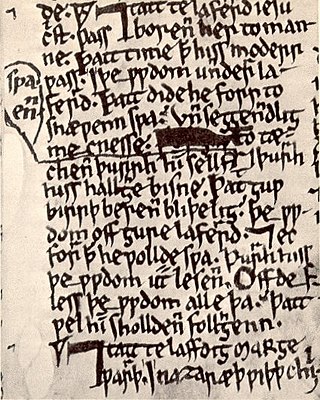Loading AI tools
The Ormulum or Orrmulum is a 12th-century work of biblical exegesis, written in early Middle English verse by a monk named Orm (or Ormin). Because of the unique phonetic orthography adopted by the author, the work preserves many details of English pronunciation at a time when the language was in flux after the Norman Conquest; consequently, despite its lack of literary merit, it is invaluable to philologists in tracing the development of English. Orm was concerned that priests were unable to speak the vernacular properly, and so he developed an idiosyncratic spelling system to tell his readers how to pronounce every vowel, and he composed his work using a strict poetic meter that ensured that readers would know which syllables were stressed. Modern scholars can use these two features to reconstruct Middle English just as Orm spoke it. The name "Orm" is derived from Old Norse, meaning worm, dragon. With the suffix of "myn" for "man" (hence "Ormin"), it was a common name throughout the Danelaw area of England. The choice between the two forms of the name was probably dictated by the meter. The title of the poem itself, "Ormulum", is modeled on the Latin speculum ("mirror"); it can be interpreted as either the boastful "Reflection of Orm" or the modest "Researches of Orm".

Wikiwand in your browser!
Seamless Wikipedia browsing. On steroids.
Every time you click a link to Wikipedia, Wiktionary or Wikiquote in your browser's search results, it will show the modern Wikiwand interface.
Wikiwand extension is a five stars, simple, with minimum permission required to keep your browsing private, safe and transparent.